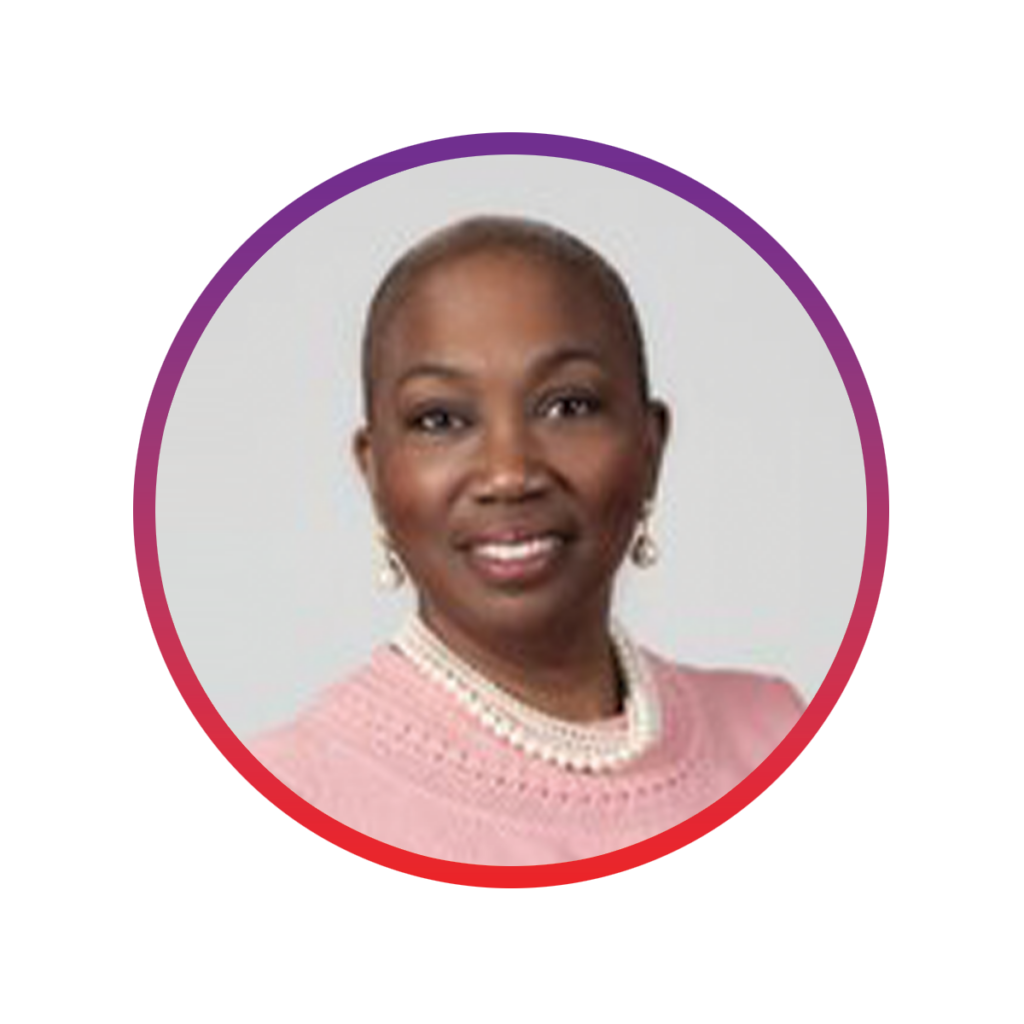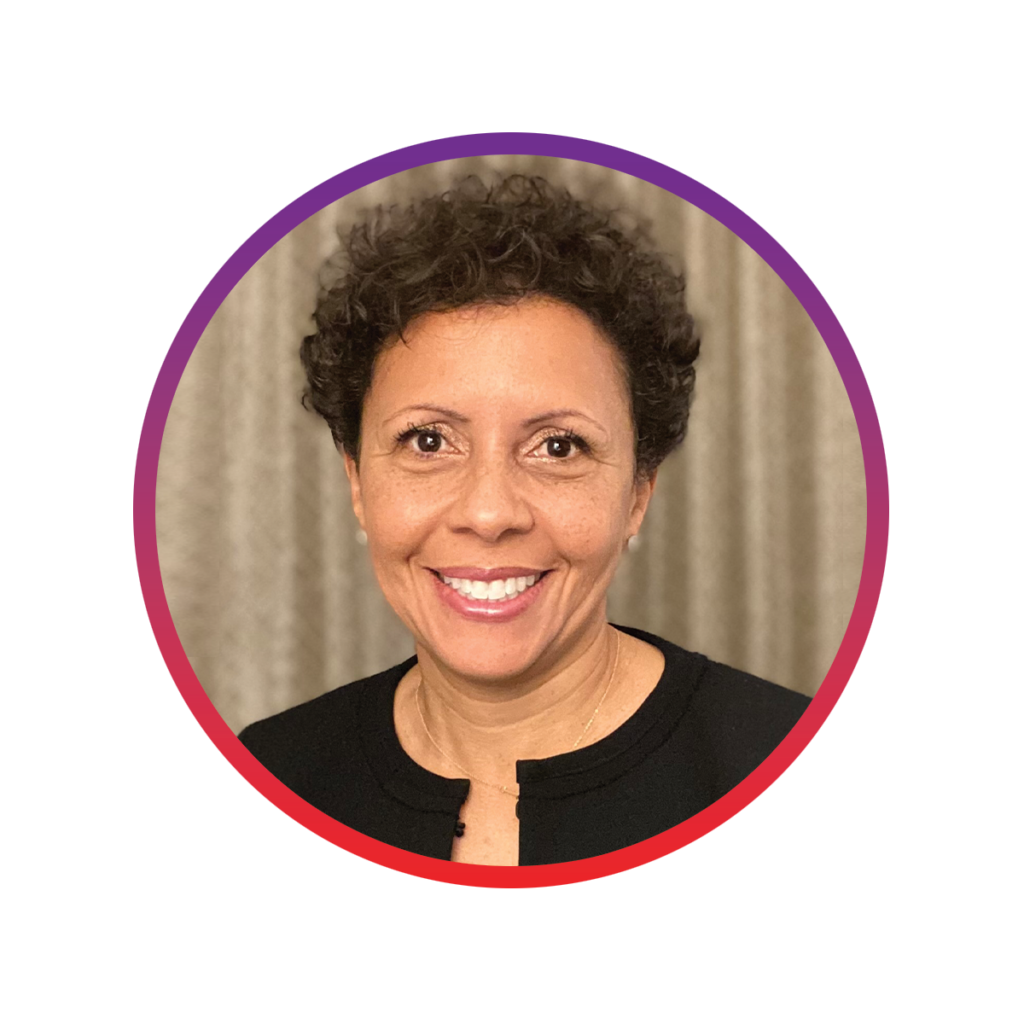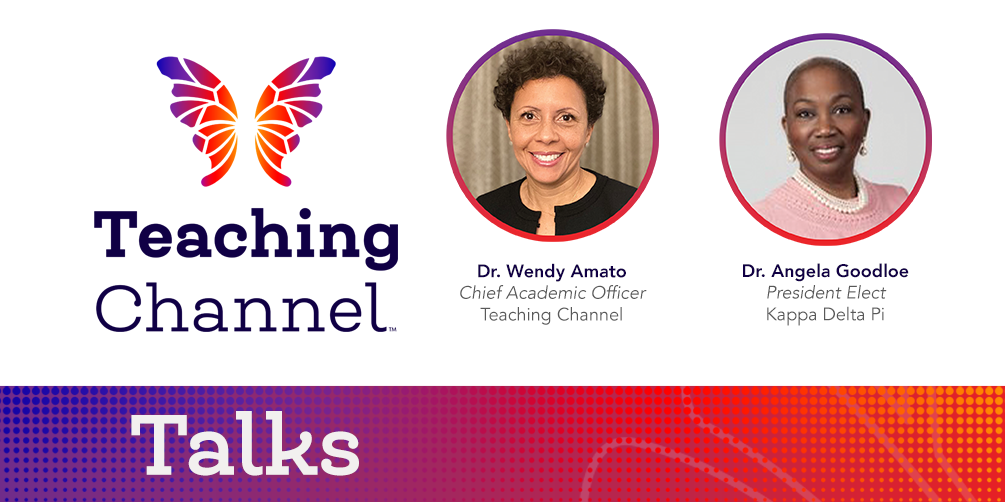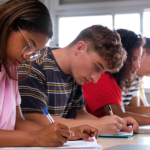In this episode of Teaching Channel Talks, Dr. Wendy Amato welcomes Dr. Angela Goodloe, President-elect of Kappa Delta Pi (KDP). This conversation focuses on Dr. Goodloe’s extensive involvement with KDP and the organization’s commitment to inclusive education while highlighting the importance of critical thinking, teacher accountability, and educator support. Dr. Goodloe also shares practical advice for new teachers, emphasizing the value of listening, self-reflection, and cultural sensitivity.
Our Guest

Dr. Angela Goodloe is the President-elect of KDP and has been a member of the organization since 2007. Her teaching career spans the U.S. coasts, international experiences in Kenya and Spain and she is currently an Assistant Professor of Education Leadership at Norfolk State University. Dr. Goodloe earned her doctorate in Education Leadership from Nova Southeastern University and holds multiple certifications, including an Administration and Supervision K–12 license, a Division Superintendent license from the Virginia Department of Education, and a Diversity, Equity, and Inclusion Certificate from Cornell University. Dr. Goodloe’s research and advocacy work centers on integrating leadership with social justice, promoting diversity, and improving the recruitment and retention of teachers and educational leaders of color.
Our Host

Dr. Wendy Amato is the Chief Academic Officer at Teaching Channel’s parent company, K12 Coalition(Open Link in new tab). Wendy earned her Master’s in Education and Ph.D. in Curriculum and Instruction from the University of Virginia. She holds an MBA from James Madison University. Wendy began teaching in 1991, has served as a Middle School Administrator, and still teaches at UVA’s School of Education. She has delivered teacher professional development workshops and student leadership workshops in the US and internationally. Wendy and her family live near Charlottesville, Virginia.
Resources for Continued Learning
Dr. Goodloe has contributed to several articles and journals on the topics discussed in this episode. Explore the links below to learn more about KDP and Dr. Goodloe’s work involving diversity, cultural responsiveness, and ethics in education.
- Teacher Candidates Using Annotated Technology Foster Cultural Responsiveness and Ethics(Open Link in new tab)
- The “Awakening Dragon”: Addressing Policies and Procedures(Open Link in new tab)
- Emergent Themes from the 2020 KDP Diversity Summit: Teacher Educators’ Awareness of Factors That Support and Retain Prospective Teachers of Color(Open Link in new tab)
In this episode, Angela and Wendy talk about the use of AI for instructional support. The K12 Hub has several resources for you to explore more on this topic:
- Teaching Channel Talks Episode 70: Why is ChatGPT Intimidating Educators? (w/Shouvik Paul)
- 50 ChatGPT Prompts for Teachers
- 65 AI Prompts for Lesson Planning
Episode Transcript
Dr. Wendy Amato: Welcome to Teaching Channel Talks. I’m your host, Wendy Amato. And as often as I can, I jump into conversations about topics that matter in education. And in this episode, I want to assure educators that previous educators are still continuing to contribute to the conversation and keep the profession elevated and lifted.
It’s my pleasure to welcome Dr. Angela Goodloe. Dr. Goodloe, welcome.
Dr. Angela Goodloe: Thank you for having me. It’s such a pleasure. I’m so excited.
Dr. Wendy Amato: When I met you at Kappa Delta Pi’s Convo 2023, I knew we needed to have this moment together and and share some of your stories. Can you tell me a little bit about your involvement with that organization?
Dr. Angela Goodloe: Yes, I have been a member of Kappa Delta PI since 2007. That was when I was first initiated and I was a advisor at that time. And my advisement was to graduate students who were in education. And so they were getting ready to get out on the field, immediately
and at that time, the group grew so incredibly fast. It was catching on. People wanted to be a part of KDP. It was new. It was fresh. We were doing some exciting things and we had both graduate and undergraduate students at the time. And then, of course, we ended up having interruption with COVID 19. And then I became a part of the national organization.
And I became the president elect of Kappa Delta Pi, and that brought in a whole new perspective, because transferring from a university counselor of the chapter to now you’re part of the national organization, you are on the board of directors as the president elect. And that means , I would think of it as.
Vice president in some other organizations, but we refer to it as president elect because of the progression that you’re making in the organization and I’m telling you the experiences and what I have come to know and learn about KDP I wouldn’t trade for anything. It is an opportunity for all educators.
to come under this umbrella to be able to say, yes, I’m for children. She believed that all children could learn and pay BP offers resources and support and conferences. For you to solidify and become the best teacher ever.
Dr. Wendy Amato: You and I agree that KDP is an amazing place for educators to grow their network.
So you really are talking about making connections that improve our practice and keep us focused on that priority of children’s learning. Tell me about the network through KDP.
Dr. Angela Goodloe: When I was a university counselor, we at the HBCU. Now, this was the first time this ever happened, Wendy. At an HBCU, we hosted KDP’s first diversity summit.
Excellent. That was big. It brought in renowned educators, Christine Sleeters, the Jacqueline Irving Jordans, and so many renowned educators, are part of KDP. In fact, they call them or refer to them as the laureates. What happens is that with, uh, the diversity summit being held at an HBCU, it really meant that KDP was not just talking the talk.
They were walking the walk. That meant a lot. It meant a lot. And we had HBC use from across the nation attending. We had educators from M. S. I. Educated and it grew Wendy. It grew the following years. We had participants from tribal universities and colleges. We had representatives from Hispanic institutions.
So it grew and just in the idea that it was growing not in participation, but it was also growing and research. Research followed these conferences as well. KDP offered and still does that opportunity to grow as an educator. And I think that’s really important that you grow in terms of not just your personal development, but also your professional development.
And I thank KDP for that every day.
Dr. Wendy Amato: The scholarship is fantastic. In fact, they have a journal and there’s some really incredible work happening that’s documented there. I’ll make sure that I put a link in our show notes for people to check out that journal. That’s wonderful. One of the things that I’m hearing as you describe the diversity event, the inaugural one that you were part of, is that KDP’s commitment to supporting all educators is incredible.
Is vibrant and active, and we see that in the continued work of the organization and the wide range of events, resources, locations, schools that are involved, representation matters and KDP is right there supporting it.
Dr. Angela Goodloe: I’m telling you, it is a great thing to know that KDP has its fingers on the pulse of educators.
Dr. Wendy Amato: And it’s ongoing work. And in fact, I think you and I both love a Michelle Obama quote. Let’s talk about that.
Dr. Angela Goodloe: Oh, yes. Michelle Obama in her book, Becoming. Here it is. She is the first lady of the United States. But for someone like that to say, I am still emerging. I’m still becoming that really tells me that personally, I have a lot of work to do as an individual.
And in my profession, because that means that you are a lifelong learner that you’re learning does not stop that your contributions your activities to make things better. Hasn’t stopped.
Dr. Wendy Amato: This is what I love knowing we’re providing to new and future educators is this understanding that we are continually becoming.
You don’t attend a workshop and check it off and say, I’m done, I’m fully formed. We are always becoming and people like you are making sure that we model lifelong learning and continue to provide new and evolving tools and resources to the educator community. It’s beautiful.
Dr. Angela Goodloe: It is the work is not done yet.
Dr. Wendy Amato: Tell me about yourself as a critical thinker.
Dr. Angela Goodloe: Ah, now you’re really getting into some really sensitive areas because I’m committed to critical thinking. I don’t care if you call it the Socratic approach. It’s learning how to debate. I think most importantly, becoming a critical thinker is the ability to look, listen, and learn multiple perspectives because your individual perspective is not the beginning and the ending of it all.
When we are inclusive, we do things better. Do you remember Temple Grandin?
Dr. Wendy Amato: Yes, tell me more.
Dr. Angela Goodloe: You are talking about somebody who has been identified with a disability and made incredible scientific advancement. How in the world can you begin to say that you don’t belong, you don’t belong, you don’t belong.
We as a nation are kicking ourselves when we are not inclusive. We have made tremendous strides. When everybody is able to come to the table and offer their own intellect in there and being comfortable in their own skin, It’s amazing.
Dr. Wendy Amato: Talking with you about critical thinking helps us make some decisions about instructional strategies and resources.
What do we want people grappling with? Are we afraid to have them think?
Dr. Angela Goodloe: Absolutely, and it worries me. It worries me when we have people who are trying to shape the narrative through eliminating or controlling curriculum when we have people are saying, you can’t read this. Don’t read it. Those things are the on the edge of creating a dogmatic society where you are not able to think critically and that’s important.
We all should have an opportunity to weed out what we think, accept what we want, and then make a decision based on the knowledge, all the knowledge that we’ve gained, all the knowledge that we’ve experienced to come up with some reasonable explanation to about what is happening or why it is not happening.
Like I said, dogma is frightening just to say, Oh, just because, ah, we have to go a little deeper than that. Our reasoning about something has to be a little bit deeper than I didn’t do that. I’m only 1 individual. What about all the people around me? How did that impact them? And how does my decision impact the rest of the people around me?
I am not in this world by myself.
Dr. Wendy Amato: This thought about impacting people around makes me really want to transition to a discussion about accountability in teaching. We are responsible to ourselves and responsible to those around us because our actions change the environment. Talk to me about teacher accountability and maybe even thinking about the risks of being a teacher today.
Dr. Angela Goodloe: Accountability in teaching means. That I am absolutely the one who’s responsible for the child’s learning outcomes go. Then the next step is, how am I going to be supported to make sure that the child learns and that is another level accountability that goes beyond my classroom doors. If you are saying that my, my students can’t read this, or this part of the curriculum should be, should not be included, then you’re tying my hands.
And how am I going to make sure that the student has learned and able to going back to critical thinking is a critical thinker to make wise decision as a citizen of the United States. So that’s one part of being accountable, making sure that your children in your classroom has what they need and you’re doing what you need to make sure that they learn.
The other part of it is outside the classroom. Am I receiving all the materials, all the support and all the support means from community all the way up to the national government. State governments, I’m not leaving those out because, as we know, curriculum is based on state governments policies, not the federal policies.
Here it is. Teachers need that support. We don’t need daggers. We need support. We don’t need our hands tied. We need support. Just because you went to school doesn’t mean that you have become the expert in delivery and content and forming relationships with your students. There’s so much more than content that a teacher who was trained is able to do.
Now. Delivery, yes, I could tell you anybody could tell you that 2 plus 2 equals 4, but how the educators, the only 1 who can make sure that a vast number of students understand not only is that answer for, but why is it for. Why is it important to learn that it’s four? So it’s not just coming up with an answer that an educator does, but it is coming up with the answer or response that will take you through your decision making process that will carry you through a lifetime.
These are social skills content. Yes, we do teach content, but we also teach other skills as well that are not separated. But integrated into the pedagogy. So again, accountability, one personal, and then the outside of your door means that it is community. It means that it’s legislative. It means that it’s resources.
Absolutely. Accountability is something that all of us should take part in, and all of us are responsible for.
Dr. Wendy Amato: I love that I can have a conversation with you about accountability, and we’re not even talking about standardized testing. We’re talking about rich understanding of concepts, transferable knowledge, life skills, and responsibility.
All of the things that a young person really does need for a lifetime.
Dr. Angela Goodloe: Yeah. Absolutely.
Dr. Wendy Amato: Absolutely. What kinds of resources would you like to see newer teachers getting? I
Dr. Angela Goodloe: would love to see them receive ways in which we relate to our students. I don’t care what you call it. I don’t care if you call it social emotional learning, cultural responsive teaching.
These things help enrich the students lives. That connect with the understanding because PJ already said that there’s no understanding that there’s not a connection and so culturally relevant teaching help students. Especially for marginalized groups, make connections when we’re talking about our citizens as a whole, we’re still talking about how are we going to help students make adjustments in terms of how do they understand the concept?
What’s what are the connections that are that a teacher is going to put forward? We still have to be able to make those connections. It’s just that when we’re talking about cultural relevancy, we’re talking about. A particular type of connection
Dr. Wendy Amato: making connections is definitely a priority and one that you and I both want to encourage in newer teachers and established teachers.
Let’s shift and get some really specific advice for new teachers. If you could list off three things that you would like to advise new teachers to keep it top of mind, what might those things be.
Dr. Angela Goodloe: My first thing would be slow to react. There is always more to a story than one side of the coin. And we’ve all heard it.
A coin has two sides. So let’s be ready to listen to what the other side says, what the other side is about. And then again, you are a critical thinker. You make the decision after you’ve read, but if you are depending, On one side, let me give you an example, too often we always hear what happened at the end of a story.
Yes. We always hear the effect, and we have grown up learning that there’s cause to the effect, but we only hear the effect. Again, let’s listen to both sides of the story. Be slow to react and ask those questions. The other thing I would probably say is to check yourself. If I say that I’m a perfect person, why are you laughing?
You make me think you don’t believe me, Wendy.
Dr. Wendy Amato: Oh, you are perfect. I’m not perfect.
Dr. Angela Goodloe: And nor am I. Because I know that I’m not perfect. I have to check myself. And that means I’m always asking myself, did I do the right thing? How can I be better at what I’m doing? Do I need to read something else to help me be better?
Do I need to go to a conference to help me become better? And when I say better, not only in terms of my personal life, but better especially as an educator. Am I taking those steps? To self reflect and become better at what I do.
Dr. Wendy Amato: We’re modeling for young people.
Dr. Angela Goodloe: And back to becoming. And I would also say listen to other people. That’s when you learn the most. Be ready to hear someone and pay attention to not just what they say. But also pay attention to how they say it and what do they mean when they say it. Again pay attention, listen and learn and learning means putting yourself out there taking another class.
I learned I’m gonna tell you another quick story. I learned very quickly I wanted to learn Spanish and I still don’t know Spanish. I say that I have survival Spanish. And I have survival French. That doesn’t mean I know the language at all, but if you put me in the country, I’ve learned enough to get from point a to point Z and knowing that survival language, I learned something about language.
I remember the first time I went to Spain and of course I was learning formal Spanish and when I went to Spain. Oh my gosh, I was using wrong words to say the same thing that it would mean in English. But it meant something else in Spanish. Those are those nuances that you have to understand about people.
Just because I say party in English and if I use the word party in Spanish, the meaning might be different. And I had to learn that the hard way.
Dr. Wendy Amato: That’s a perfect end to the three pieces of advice. Be slow to react, check your assumptions, and watch and listen for cultural nuances. Valuable guidance for teachers at all levels of experience.
Dr. Goodloe, thank you for being my guest today. Thank you for having me and I appreciate it so much. To our fellow educators, thank you for joining our conversation. If you’d like to explore topics that Dr. Goodlow and I discussed today, please check out the show notes at teachingchannel. com slash podcast.
Be sure to subscribe on whatever listening app you use that will help others to find us. And I’ll see you again soon for another episode. Thanks for listening.







